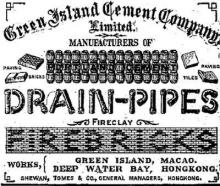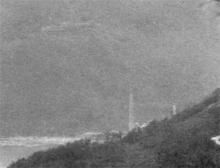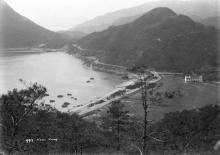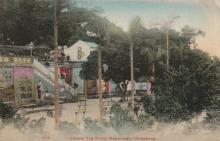Brick Works, Deep Water Bay [c.1889-c.1931]
Primary tabs
[30 Aug 2019 & 29 Jan 2020: Updated timeline with new info from comments.]
The northern area of Ocean Park, near to Wong Chuk Hang Road, sits at the foot of Brick Hill. That hill takes its name from a Brick Works that used to be on the site.
1889 - The earliest mention of the Brick Works we've found is from 1889, when it was owned by The Hong Kong Brick & Cement Co. Ltd.
1896 - The brick works were sold to the Green Island Cement Co.
1927 - A newspaper report from 1928 on Green Island Cement notes that the Brick Works was making a loss, and was closed on 31st December 1927. The report (copied below) says the plant was mothballed so it could be restarted if needed, but I haven't found any record of it being used again after 1927.
1931 - The annual meeting of the Green Island Cement Co. noted that the machinery and some of the buildings at Deep Water Bay had been sold, but they weren't yet able to sell the land / remaining buildings.
Extract from article on page 14 of The Hong Kong Telegraph, 1928-03-21:
Deep Water Bay Losses.
With regard to our Deep Water Bay works, I regret to say that the results again show a heavy loss. Your Board gave a great deal of attention to these works during the year and, after careful consideration, it was decided in August last that the most prudent course to pursue was to close down. It was hot possible, however, to shut down entirely until 31st December, as we had contracted to supply Government requirements for the year 1927. So soon, however, as your Directors were able to reach a decision, notice was given to the Superintendent and to one of his assistants, and charges reduced, to a minimum commensurate with the maintenance of the installation in a condition rendering it capable of being operated again should conditions so warrant.
Since the first of the current year, the works have been completely closed down, thus effecting a material saving; in this connexion your Board have deemed it prudent to recommend the allocation to a Contingency Reserve out of the profits for the year 1927 of an amount of $20,000, against the possible contingency of loss in the working for the current year on sales of such stocks as remain on hand.





Comments
A map from 1895 (Plate 2-5,
A map from 1895 (Plate 2-5, Mapping Hong Kong) has buildings labelled "brickworks" marked at this location. I've pushed the completion date back from c.1907 to c.1895.
1908
There are a couple of mentions of this factory in Twentieth century impressions of Hong-kong, Shanghai, and other Treaty Ports of China, published in 1908:
1902
I'm not sure if the works were built by Green Island Cement [GIC], or acquired by them. The earliest connection I've found so far is a mention in a report on the GIC's annual meeting on page 3 of The Hong Kong Telegraph, 1902-04-14:
"The Brick Works at D. W. Bay leave a fair return on the Capital invested, but a good deal is required there in the way of improvements so we have written off the equivalent of the profit as Depreciation."
1908
There's a good description in the 1908 publication, "Twentieth century impressions of Hong-kong, Shanghai, and other Treaty Ports of China":
THE HONGKONG PIPE, BRICK, AND TILE WORKS.
So important is the industry carried on in connection with the Green Island Cement Company at the Deep Water Bay Pipe. Brick, and Tile Works, that mention may well be made of it under a separate heading. The works are admirably situated at the western end of the bay, just opposite Aberdeen. The buildings cover a large area, and include kilns, drying sheds, offices, boiler and engine house, and everything appertaining to works of the kind. In the vicinity of the works are veins of the clay used for the manufacture of bricks, pipes, &c., and the raw material can thus be procured at nominal cost. The clay is first ground in a milling machine, and then mixed with water and other ingredients. It is next forced through a machine which delivers it in a continuous length of oblong section, and is cut up by means of a wire cutter. The bricks are dried by steam-heat, and then fired in kilns for about twenty days. Of the fourteen kilns in use three have a capacity of 30,000 bricks each.
Fire bricks go through practically the same process, but the clay of which they are made contains from ?? to 90 per cent, of silica. In the manufacture of pipes finely powdered clay is carefully mixed with water to a certain consistency, and the compound is passed between heavy rollers to ensure complete pulverisation, and then into the moulding machine, where it is pressed into the required shape. The pipes are dried and then burned in kilns for over twenty days, after which they are brought to a white heat and glazed, salt and sulphur being the chief agents employed in this last-mentioned process. The lime required for the works is made from imported stone, and recently, by the erection of another kiln, the output was increased in order to meet a growing local demand for lime.
The superintendent of the works, Mr. J. B. Witchell, who has been with the Company for about ten years, has been responsible for many improvements, tending both to save labour and to improve the quality of the products of the works. He lives on a hill overlooking the bay, and excellent quarters have been provided on a hill opposite for the coolies employed at the works. The general managers are Messrs. Shewan, Tomes & Co.
HK Brick & Cement Works Co. Ltd. at Deep Water Bay 1889-1896
The "brickworks" in Mapping Hong Kong at Deep Water Bay is related to the Hong Kong Brick and Cement Co. Ltd. The Green Island Cement Co. took over the brick works in 1896.
1. HKGRO - Govt. Gazette 20 April 1889 (See here )
The Hong Kong Brick & Cement Co. Ltd is now prepared to manufacture machine-pressed building bricks.
2. China Mail 28 December 1889 (See here )
The Manager reported difficulties encountered in the works at Deep Water Bay.
3. HK Weekly Press 16 January 1896 (See here )
The Chairman reported that the Company had run short of funds and the directors do not envisage guaranteeing further overdrafts with the Company's bankers. After agreement had been made with the Green Island Cement Co. for the transfer of the Company's business and property to them for cash, the HK Brick & Cement Co. Ltd was subsequently wound up.
Thanks Moddsey, I've updated
Thanks Moddsey, I've updated the dates & timeline with your new information.
The story continues...
At the annual meeting of the Green Island Cement Co. on the morning of 18th March 1931, there was mention that the Company had little success in the disposal of the Company's land at Deep Water Bay. At one point in the middle of the preceding year The Sports Club had sought an option to purchase the land and remaining buildings (after the sale of machinery and some of the buildings) but for unspecified reasons the negotiations stalled and was aborted. The profit side for the Company in the preceding year was augmented by the sale of such machinery and buildings at Deep Water Bay for the purpsoe of demolition with the profit to the Company in the magnitude of HK$ 13,514.94. So the remaining buildings and land at Deep Water Bay remained undisposed of at the begining of 1931....
The lengthy article starts on page 1 and then continues on page 8 for those who are interested:
Source: The Hong Kong Telegraph, page 1 and 8, 18th March 1931
https://mmis.hkpl.gov.hk/coverpage/-/coverpage/view?_coverpage_WAR_mmisp...
Bricks on the beach below the old brickworks
Back in 2018 I was gwuloing along the beach beneath the site of the old brickworks on the western side of Deep Water Bay when I noticed the unusually large number of old bricks, tiles and half-pipes lying around. Most were just broken fragments but some were still whole. Some of the bricks bore one of three markings...
Firstly, "DWB",
Secondly, "HKB",...
...and thirdly, "GIC".
I presume they were all manufactured on-site at the brickworks between the 1890's and 1930's and that "DWB" stands for Deep Water Bay, "HKB" for Hong Kong Brickworks, and "GIC" for "Green Island Cement Company". Don't know why they are on the beach. Perhaps they were sub-standard, so couldn't be sold and were just dumped onto the beach. In support of this possibility is the fact that the two bricks at the top of the "DWB" pic are actually fused together (which is why the top one is the wrong way up).
Each one a piece of history.
@ "Don't know why they are on the beach"
@ "Don't know why they are on the beach......... Each one a piece of history"
I bet they are not on the beach now.
Re: Piping on the Beach
In 1889 it was mentioned that the Hong Kong Brick & Cement Co. manufactured drainpipes in addition to producing fire bricks. China Mail 28 December 1889 refers.
Bricks
Bricks: The house where I grew up in Taipo was on the site of a house originally built by and for the KCR (Kowloon Canton Railway ) and in the garden there were any number of bricks inscribed KCR.
General opinion was that this had been done to establish their ownership should any fall off the back of the truck taking them from the kiln to the building site. There were also lengths of rail track, but we never shifted them as they weighed literally a ton each. Sorry no pictures.
Hong Kong Brick and Cement Co
Friends brought me to Deep water bay to dig out whether any bricks left on the beach. Few pieces were seen.
1886/8/7 Hong Kong Daily Press
Some months ago a syndicate was formed for the purpose of starting a brick and cement manufactory in Hong Kong. After experimenting on the cly and limestone found in the colony samples were sent to England and most favourably reported on for the manufacture of brick and cement, and estimates of machinery were ordered from builders in England. On Saturday a meeting of the syndicate was held and all particulars of cost and general information were laid before the meeting, when it was resolved to register the Company under the Limited Liability Act as “The Hongkong Brick and Cement Co., Limited” with a capital of $100,000 in 4000 shares of $25 each, $20000 to be paid up at once and the balance, $90000 as soon as the Company is registered. The whole of the capital has already been fully subscribed by the syndicate. The following gentlement were elected directors: Messrs C.P Chater(Chairman), D.Gillies, J. B. Coughtrie, W.Wotton, and J. Orange. The machinery has already been ordered out from home by wire. The brickmaking will be commenced almost immediately and the cement later on.